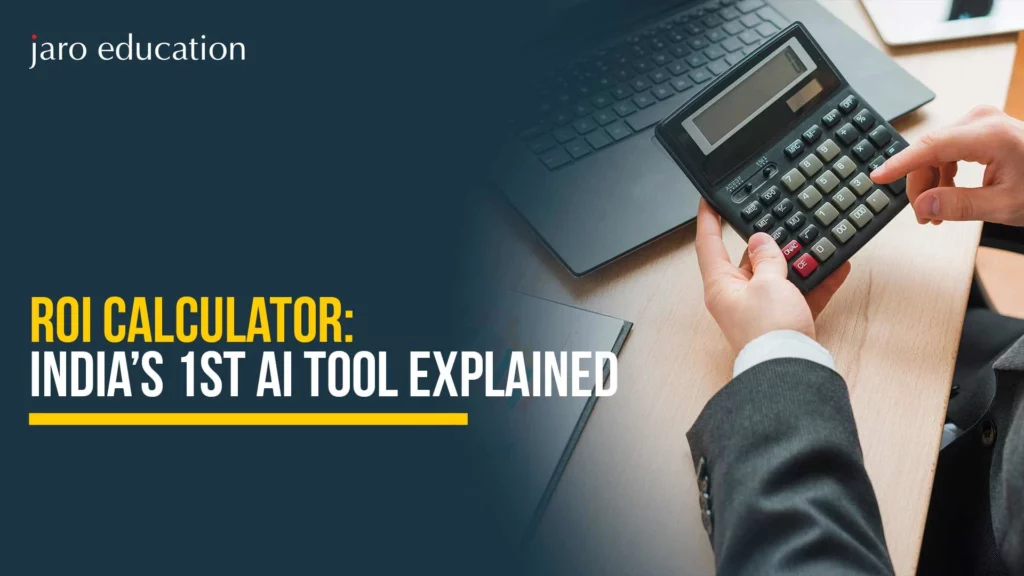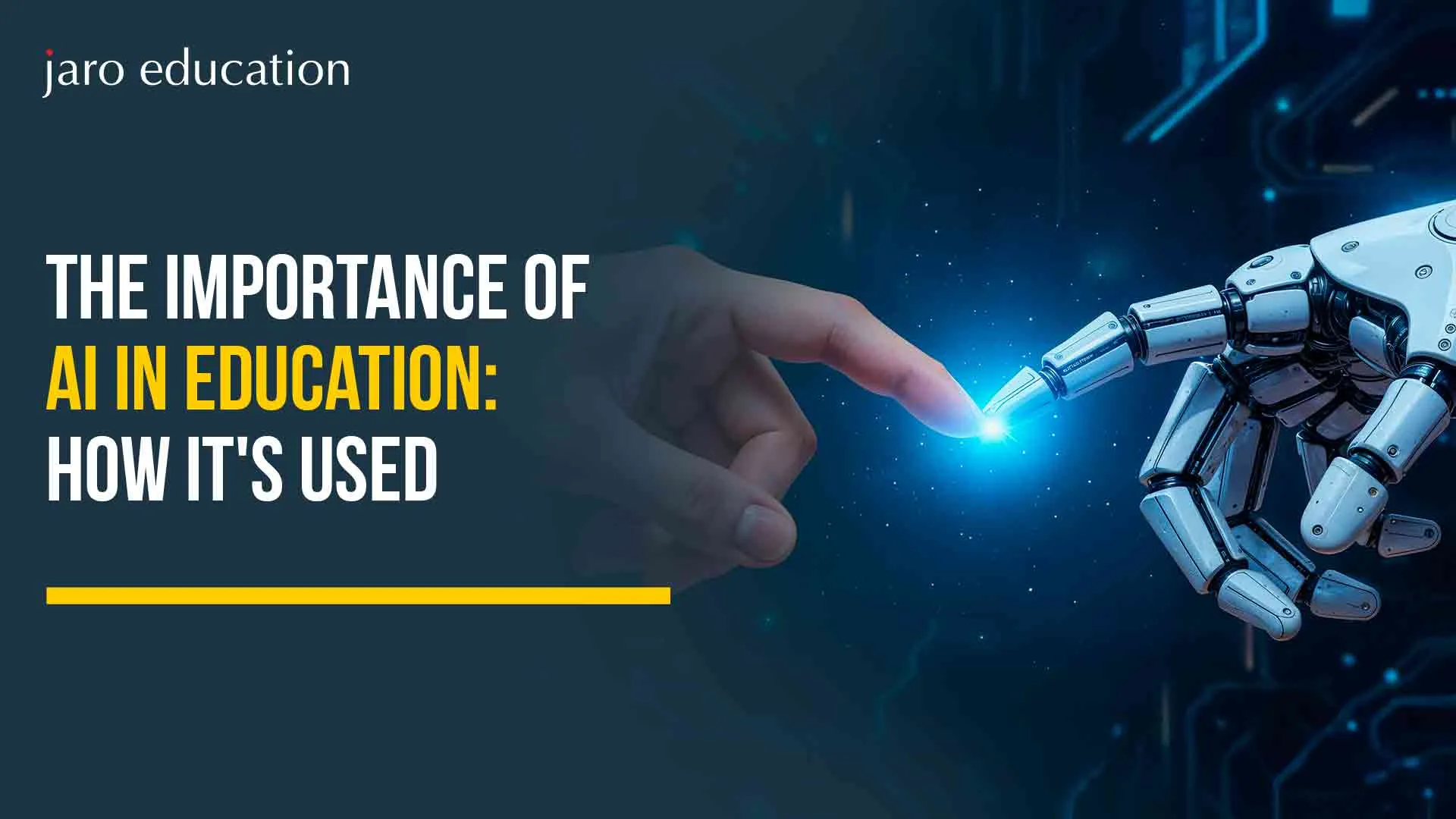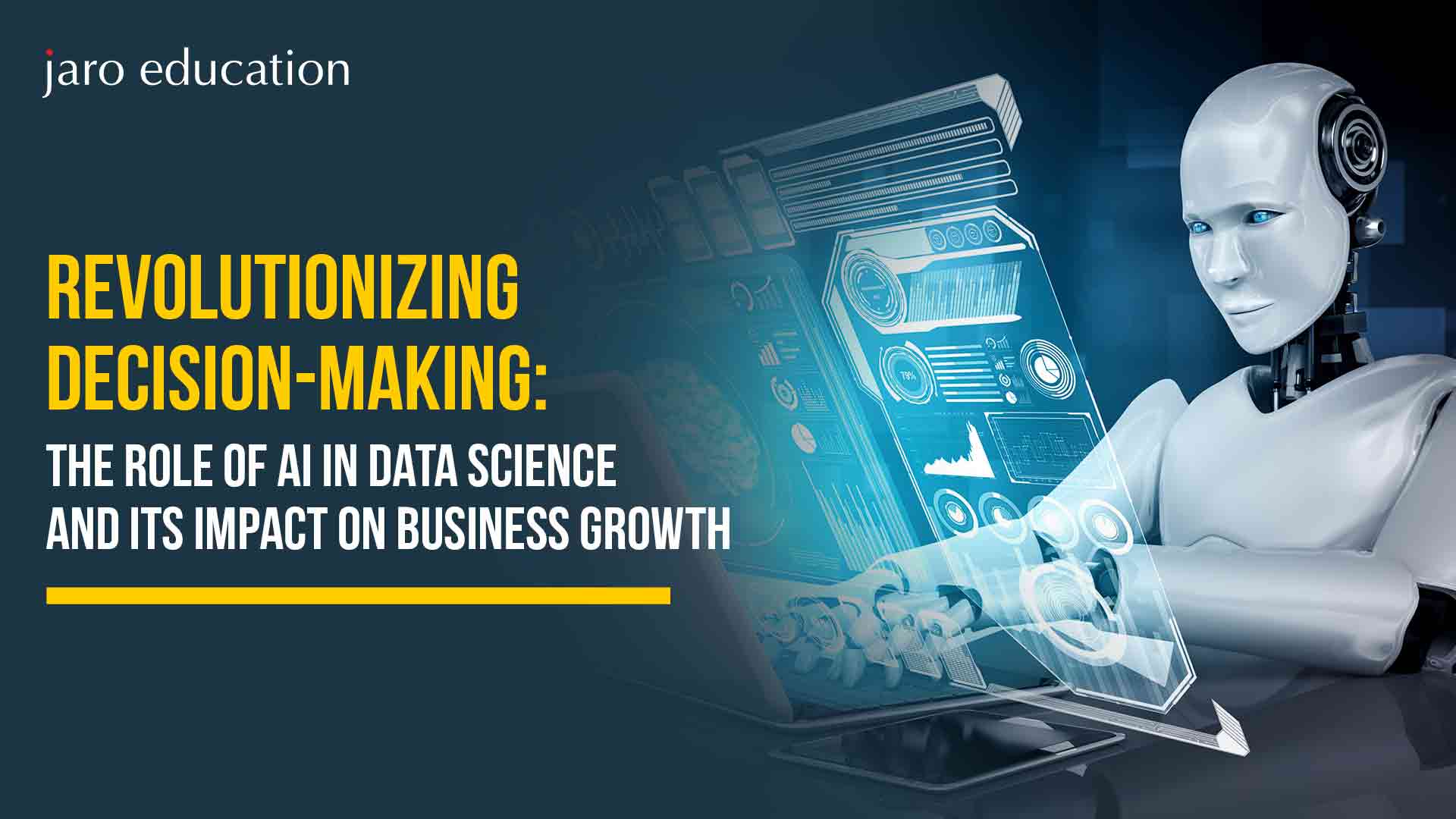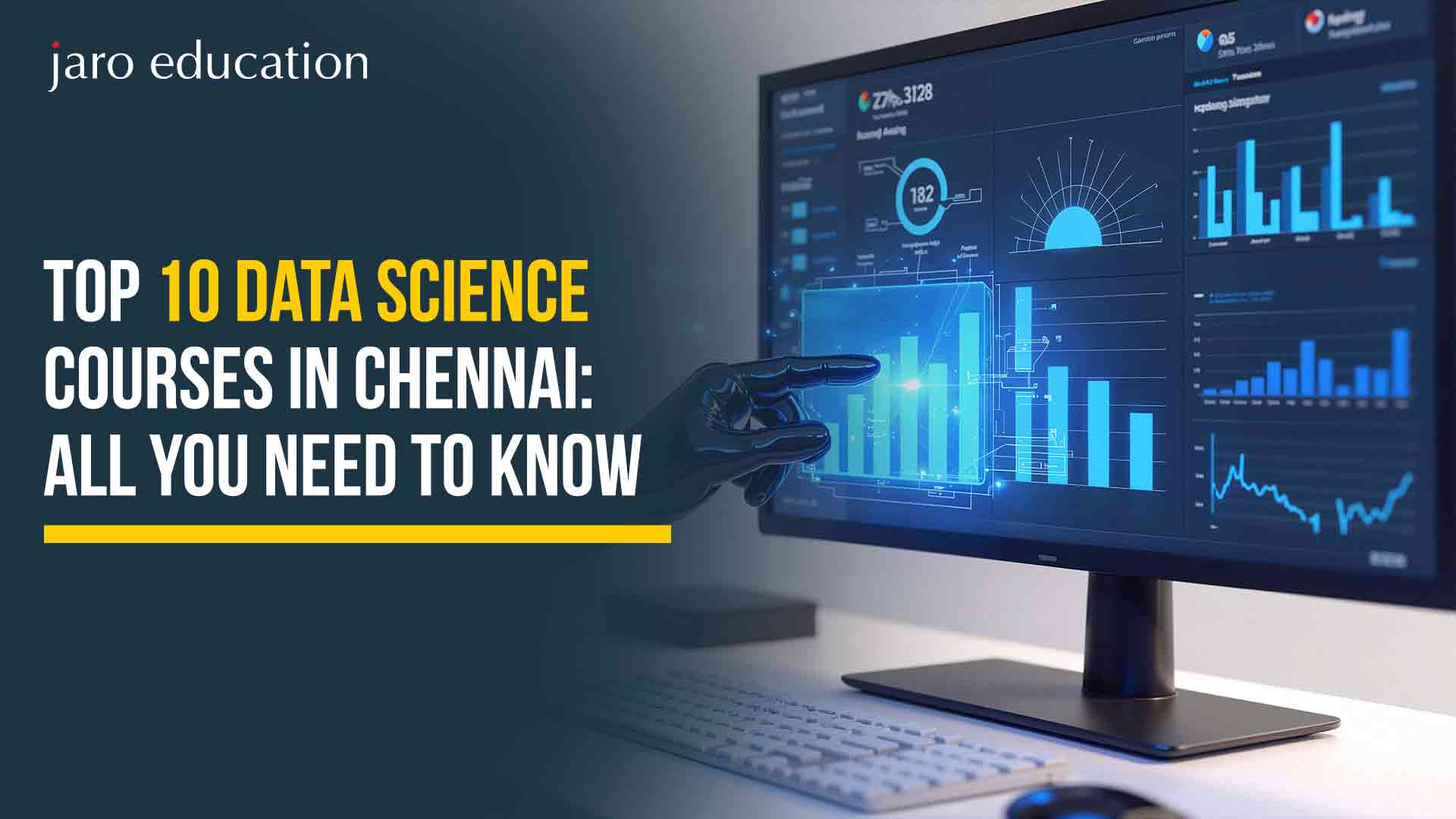AI vs Data Science: Which is Better for the Future?
Table of Contents
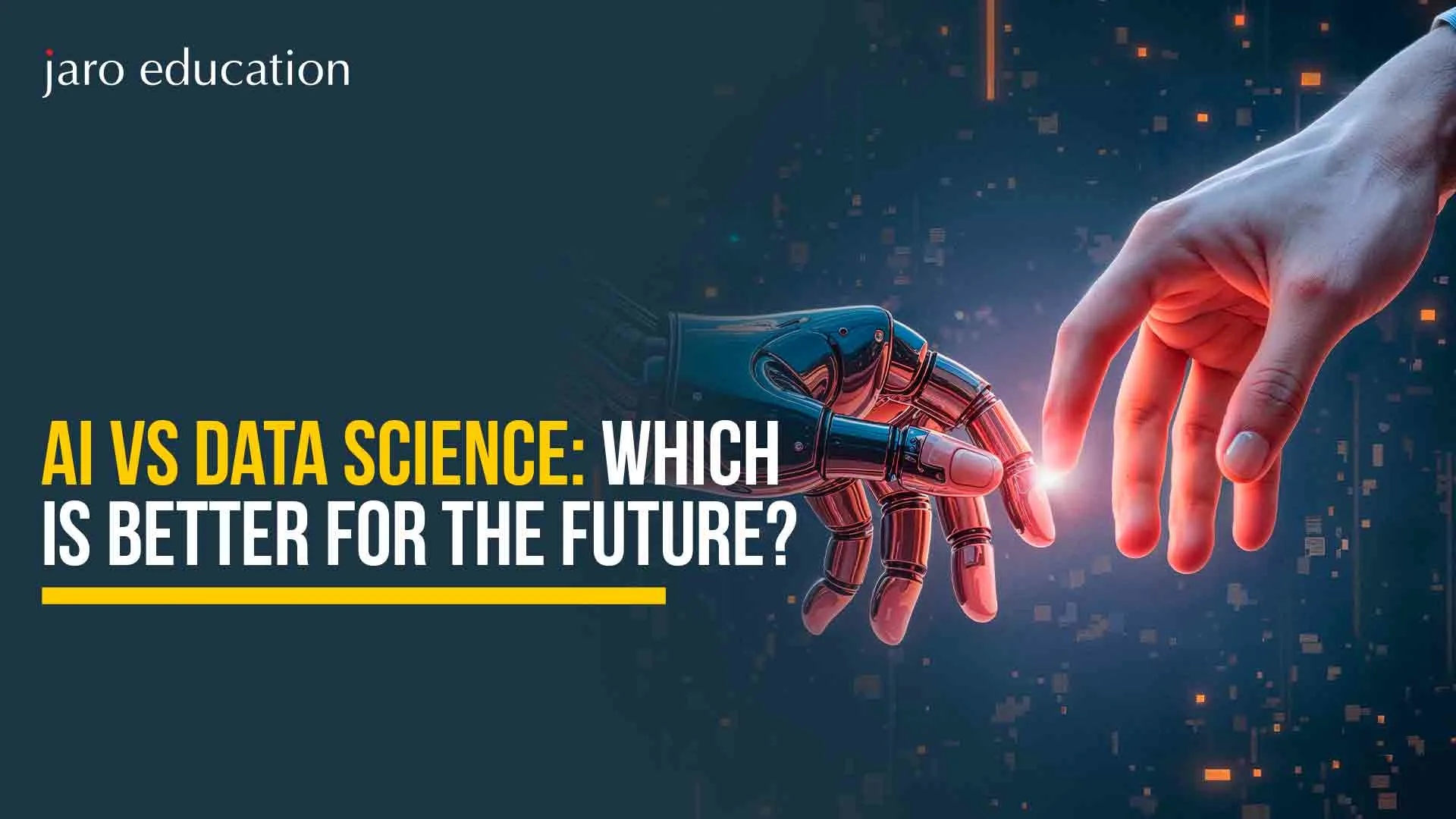
In today’s rapidly evolving technological landscape, one of the most significant debates among students, professionals, and tech enthusiasts is the question: AI vs data science — which path holds greater promise for the future? The world is witnessing the exponential rise of both fields, each reshaping industries, redefining careers, and revolutionising how businesses operate. Yet, the dilemma remains: when comparing AI vs data science, which is truly the better choice for the years ahead?
To answer this question comprehensively, it is crucial to first understand what data science is, delve deep into the foundations of data science and artificial intelligence, and explore the intricate difference between data science and artificial intelligence. Only then can we embark on a thorough evaluation of data science vs. artificial intelligence and determine where the true potential lies.
What is Data Science?
Before dissecting AI vs. data science, we must establish a clear understanding of what data science is. Data science is a multidisciplinary field that focuses on extracting meaningful insights, knowledge, and patterns from structured and unstructured data. It combines elements from statistics, mathematics, computer science, and domain-specific expertise to transform vast amounts of data into actionable intelligence.
The core activities involved in what is data science include:
- Data collection and cleaning
- Data exploration and analysis
- Statistical modelling
- Machine learning implementation
- Data visualisation and storytelling
- Decision-making based on data-driven insights
Today, data science is the backbone of sectors like finance, healthcare, marketing, manufacturing, and beyond. Organisations use data science to predict customer behaviour, optimise operations, forecast trends, and personalise services. This real-world utility forms an essential part of the AI data science discussion.
Understanding Data Science and Artificial Intelligence
The next step in unravelling the AI vs data science debate is grasping data science and artificial intelligence. While they are often mentioned together, they are not identical.
Data science and artificial intelligence intersect in many areas, but they serve different fundamental purposes. Data science aims to extract knowledge and insights from data. Artificial intelligence (AI), on the other hand, focuses on creating systems that can perform tasks that typically require human intelligence, such as recognising speech, making decisions, translating languages, and even diagnosing medical conditions.
AI data science represents the synergy between these fields, where data science provides the data and the analytical techniques necessary to train and improve AI models. Without the frameworks provided by data science and artificial intelligence, it would lack the necessary fuel — massive datasets and predictive insights — to evolve.
Thus, the relationship between data science and artificial intelligence is symbiotic. Yet, understanding the difference between data science and artificial intelligence is key to choosing the right career path and understanding the future trajectory of data science vs. artificial intelligence.
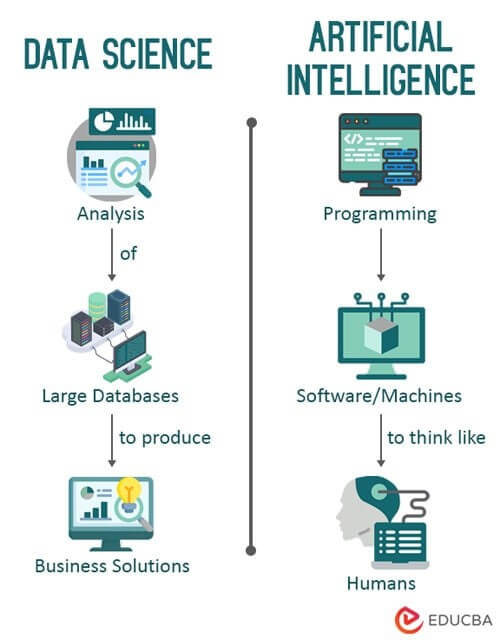
*cdn.educba.com
Difference Between Data Science and Artificial Intelligence
When comparing AI vs data science, it is critical to delve into the difference between data science and artificial intelligence.
| Category | Data Science | Artificial Intelligence |
|---|---|---|
| Objective | Extracting insights from data | Building machines that emulate human intelligence |
| Core Skills | Statistical analysis, data mining, data visualisation | Machine learning, deep learning, and cognitive computing |
| Output | Actionable insights, predictions, patterns | Intelligent systems capable of decision-making |
| Data Dependency | Heavily dependent on data analysis | Requires data for training, but focuses on automation |
| Techniques | Regression, clustering, classification | Neural networks, reinforcement learning, NLP |
The difference between data science and artificial intelligence becomes even more apparent when looking at their applications. For example, a data science project may involve analysing customer churn rates for a telecom company, whereas an artificial intelligence project might involve developing a chatbot capable of handling complex customer queries without human intervention.
In other words, AI data science involves leveraging data science methods to advance artificial intelligence systems. But data science does not necessarily aim to create intelligence; it focuses on deriving meaning and insights.
Understanding the difference between data science and artificial intelligence helps stakeholders appreciate why data science vs artificial intelligence is a comparison of complementary fields rather than strictly competing ones.
Current Trends: AI vs Data Science
To thoroughly evaluate AI vs data science, we must examine the current trends shaping both fields. Both domains are undergoing rapid innovation, but their trajectories are subtly different.
Trends in Data Science
- Automated Data Science: Tools like AutoML are simplifying processes, reducing the need for deep expertise in statistics.
- Real-time Data Processing: Businesses demand faster, real-time insights, driving innovation in stream processing technologies.
- Data Privacy and Ethics: With increasing regulations like GDPR and CCPA, ethical data usage and governance are gaining prominence.
- Niche Specialisations: New roles such as “Data Science Engineer”, “DataOps Specialist”, and “Decision Scientist” are emerging.
Trends in Artificial Intelligence
- Explainable AI (XAI): There is growing emphasis on making AI decisions interpretable and transparent.
- AI in Edge Computing: AI models are being deployed on edge devices like smartphones and IoT sensors.
- Generative AI: Technologies like ChatGPT, Midjourney, and DALL-E have highlighted the creative capabilities of AI.
- Autonomous Systems: From self-driving cars to drone swarms, AI is pushing autonomy in machines to new levels.
In this context, AI vs data science is not merely about growth rates but also about impact. Artificial intelligence is increasingly becoming a direct consumer-facing technology (think Alexa, Siri, and autonomous vehicles), while data science remains a crucial, often behind-the-scenes analytical engine that powers strategic decision-making.
Career Opportunities: AI vs Data Science
A major practical aspect of the AI vs. data science debate revolves around career prospects. Where should an ambitious student, mid-career professional, or tech enthusiast place their bets?
Career in Data Science
A career following what is data science entails roles like:
- Data Scientist
- Data Analyst
- Business Intelligence Developer
- Data Engineer
- Machine Learning Engineer (overlapping with AI)
The demand for data science professionals remains extremely high. Companies across industries — from finance to healthcare, from tech startups to Fortune 500 giants — require data experts to interpret information and extract actionable intelligence.
Moreover, as organisations struggle with “data deluge”, experts who can wrangle big data, clean it, analyse it, and tell compelling stories with it are more valuable than ever.
Career in Artificial Intelligence
In the domain of data science and artificial intelligence, the AI side offers exciting roles such as:
- AI Engineer
- Computer Vision Engineer
- NLP Specialist
- Robotics Scientist
- AI Research Scientist
The future of artificial intelligence careers looks thrilling. With governments, multinational corporations, and even startups investing billions into AI research and applications, the need for AI experts is skyrocketing. From building ethical AI systems to designing sentient robots, AI professionals will shape the very fabric of the future.
Thus, when considering AI vs data science, those attracted by problem-solving, pattern discovery, and strategic analysis may lean towards data science, while those driven by the dream of building thinking machines may be better suited to artificial intelligence.
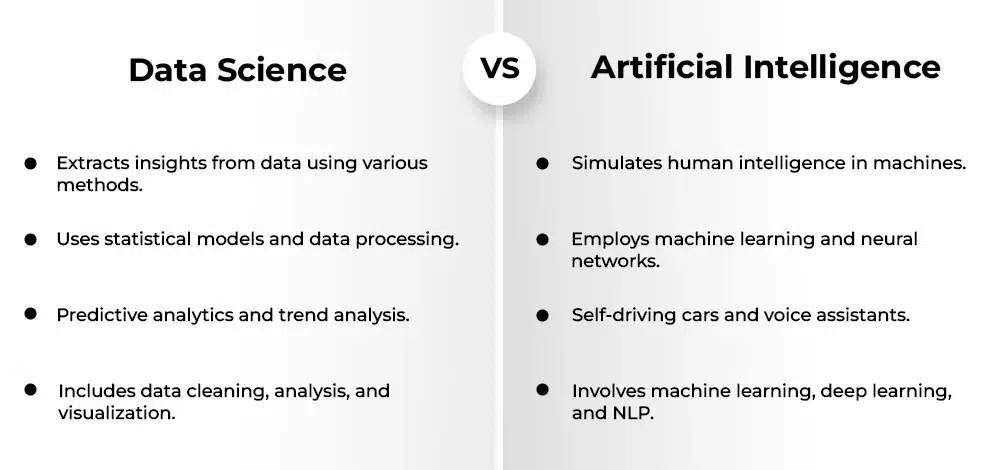
*media.geeksforgeeks.org
Future Scope Comparison: AI vs Data Science
One of the most crucial aspects in the AI vs data science debate is future scope. How far can each field go? Will one outshine the other, or will they continue to complement each other in evolving ways?
Future of Data Science
Understanding what data science is in the future context involves recognising that data will only grow in volume, velocity, and variety.
Key factors driving the future of data science include:
- Big Data Explosion: By 2026, global data is expected to grow to 175 zettabytes, according to IDC.
- IoT Proliferation: Devices around the world are producing real-time data streams that need sophisticated analysis.
- Personalisation Demand: Businesses need hyper-personalised services, and data science makes it possible through customer segmentation, predictive modelling, and recommendation systems.
- Healthcare Revolution: Predictive analytics in healthcare, powered by data science, will improve diagnoses, treatment personalisation, and epidemic forecasting.
Thus, AI data science will remain essential as long as data exists and businesses seek to make intelligent decisions.
Future of Artificial Intelligence
Data science and artificial intelligence together create powerful synergies, but the standalone future of artificial intelligence is even more fascinating:
- Artificial General Intelligence (AGI): Researchers are actively working towards building machines that possess human-like understanding and reasoning capabilities.
- AI Ethics and Governance: As AI systems gain decision-making authority, building ethical and bias-free AI will become a critical priority.
- Automation of Knowledge Work: From law to journalism, AI will automate intellectual tasks, reshaping entire industries.
- Healthcare, Education, and Defence: AI applications will revolutionise critical sectors, enhancing lives but also demanding careful oversight.
When weighing AI vs data science in terms of future excitement and transformational potential, artificial intelligence appears to hold a slight edge. However, without data science, AI cannot thrive, emphasising the continued importance of data science vs artificial intelligence partnerships.
Industry-Wise Adoption: AI vs Data Science
To truly grasp AI vs data science, we must examine how different industries are adopting these technologies.
Data Science Adoption
- Retail: Data-driven inventory management, customer segmentation, personalised marketing.
- Banking: Fraud detection, risk analytics, customer churn prediction.
- Healthcare: Predictive analytics for disease outbreak tracking and patient readmission.
- Telecommunications: network optimisation, customer behaviour analysis.
Artificial Intelligence Adoption
- Manufacturing: Predictive maintenance, robotics-driven production.
- Healthcare: AI-driven diagnostics, robotic surgeries, AI drug discovery.
- Automotive: Autonomous vehicles, intelligent navigation systems.
- Defence and Security: Surveillance systems, threat detection algorithms.
The difference between data science and artificial intelligence becomes even clearer at the industry level: data science helps optimise and predict, while artificial intelligence aims to automate and act.
Thus, when comparing data science vs artificial intelligence, it becomes evident that while data science enhances human decision-making, artificial intelligence increasingly aims to replace it where feasible.
Educational Pathways and Skills: AI vs Data Science
Choosing between AI vs data science often starts with education and skill acquisition. What does it take to enter and excel in each field?
Becoming a Data Scientist
To pursue what is data science, one typically needs:
- A strong foundation in mathematics and statistics
- Programming skills, especially Python, R, and SQL
- Expertise in data wrangling and cleaning
- Knowledge of machine learning basics
- Proficiency in data visualisation (Tableau, Power BI)
- Understanding of business and domain knowledge
Becoming an AI Professional
To specialise in data science and artificial intelligence with a focus on AI, one needs:
- Deep understanding of algorithms, mathematics, and logic
- Expertise in machine learning, deep learning, and reinforcement learning
- Mastery of frameworks like TensorFlow, PyTorch, and Keras
- Knowledge of neural networks, NLP, and computer vision
- Strong software engineering skills
Advanced degrees (Master’s/PhD) in AI or machine learning are often preferred for high-end research roles.
In terms of skill acquisition difficulty for AI vs. data science, AI tends to demand deeper technical expertise and research orientation compared to data science, which, while challenging, is often seen as more accessible to a broader range of learners.
Challenges in Both Fields
No discussion on AI vs data science would be complete without acknowledging the challenges that professionals in both fields face.
Challenges in Data Science
- Data Quality Issues: Garbage in, garbage out — poor data leads to poor insights.
- Complexity in Modelling: Real-world data is messy; building accurate models is hard.
- Interpretability: Explaining complex models to non-technical stakeholders remains tough.
- Ethical Dilemmas: Biased data can lead to biased decisions.
Challenges in Artificial Intelligence
- Algorithmic Bias: AI systems can perpetuate societal biases if not carefully managed.
- High Costs: Building AI systems requires huge computational resources and investment.
- Job Displacement Fear: Widespread automation could disrupt many job markets.
- Regulation and Accountability: Legal frameworks for AI behaviour are still evolving.
Thus, the difference between data science and artificial intelligence is also seen in the kinds of challenges faced: data science struggles with messy, unpredictable data, while artificial intelligence faces issues of autonomy, bias, and social impact.
Final Thoughts
After a deep exploration of AI vs data science, including what is data science, data science and artificial intelligence dynamics, AI data science synergies, the difference between data science and artificial intelligence, and a complete data science vs artificial intelligence comparison across industries, skills, and challenges, where do we stand?
The truth is nuanced:
- Data science will remain indispensable. As long as businesses need data-driven insights for strategic decision-making, data science will thrive.
- Artificial intelligence will lead the next wave of technological disruption, pushing the boundaries of what machines can achieve.
- AI Data Science — the convergence of both — will create the most significant opportunities, blending deep data analytics with cognitive automation.
Thus, the “program” of the future is not an exclusive AI vs. data science war. Rather, it is an integration: those who understand data science deeply and can apply it to power artificial intelligence systems will lead the innovation economy.
Choosing a side between data science vs. artificial intelligence might thus not be the best strategy. Instead, embracing both and building interdisciplinary expertise could be the smartest move for future-proofing your career.
In conclusion, the answer to AI vs data science is not about which is better — it is about how you can leverage the strengths of both to become a linchpin of the future digital economy.
Frequently Asked Questions
Can a professional switch from Data Science to AI later in their career?
Yes, many professionals start in data science roles and later transition to artificial intelligence. Since data analysis and machine learning fundamentals overlap, gaining deeper knowledge in deep learning, computer vision, or natural language processing can facilitate a smooth shift into AI-specific careers.
Is coding more important in AI compared to Data Science?
While both fields require programming skills, AI often demands more advanced coding abilities. In AI, you might need to implement complex algorithms from scratch or optimise neural networks, whereas data science often focuses on using existing libraries and tools for data analysis and modelling.
Which field, AI or Data Science, offers more entrepreneurial opportunities?
Both offer strong entrepreneurial potential, but AI tends to dominate high-tech startup ecosystems. From creating AI-driven apps to offering AI consulting services, the demand for innovative AI products is massive. However, niche data science consultancies are also thriving, especially in industries like healthcare analytics and fintech.
How important are cloud platforms like AWS, Azure, or GCP for AI and Data Science?
Extremely important. Cloud services offer scalable infrastructure for big data processing and AI model training. Expertise in cloud platforms is becoming a crucial differentiator for professionals in both fields, enabling efficient deployment of models and handling of massive datasets.
Will AI eventually replace Data Scientists?
Unlikely in the near future. While AI can automate some tasks traditionally performed by data scientists, the human element — critical thinking, ethical judgement, problem formulation, and domain expertise — remains essential. Instead of replacement, the future will see data science and artificial intelligence merging more closely, creating new hybrid roles.






![Top-Career-Opportunities-After-PhD-in-India-[2025]](https://jaro-website.s3.ap-south-1.amazonaws.com/2025/10/Top-Career-Opportunities-After-PhD-in-India-2025-1024x576.webp)
